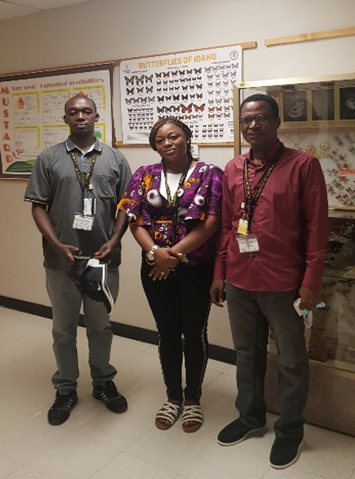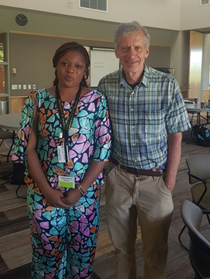Training Grant awardees share their experience
Three of our Training Grant awardees describe their experience at the University of Idaho Biology of Vector-Borne Disease course
In June 2021 three of our Network members used their Training Grant awards to attend a Biology of Vector-Borne Disease training course at the University of Idaho:
- Tolani Adegbite Okelola from the National Agricultural Seeds Council, Nigeria
- Anthony Simiyu Mabele from Masinde Muliro University of Science and Technology, Kakamega, Kenya
- Ajayi Ayodele Martins from the Department of Crop, Soil and Pest Management, Federal University of Technology, Akure, Ondo State, Nigeria
Read on as they describe their experiences of the trip.

Anthony, Tolani and Ajayi
REPORT ON BIOLOGY OF VECTOR-BORNE DISEASES TRAINING AT THE UNIVERSITY OF IDAHO, MOSCOW, USA
Three CONNECTED Virus Network members; Ajayi Ayodele Martins (Plant Pathologist), Tolani Adegbite Okelola (Seed analyst and Plant Virologist) and Anthony Simiyu Mabele (Molecular Plant Virologist) attended the 2021 Biology of vector-borne disease (BVBD) training course at the University of Idaho, Moscow, USA. The training started on Sunday 20th June 2021 and ended on Friday 25th June 2021.
The BVBD training was organized by the Center for Health in the Human Ecosystem at the University of Idaho. The training was informative, practical and inspiring for all three of us. It was also our first visit to the USA. We met and networked with diverse practitioners and found common ground across plant, animal and human vector-borne diseases.

The training included an introduction to vector-borne disease cycles, the common biological features and key distinctions between plant, animal and human vector-borne diseases, and the containment challenges for this type of work. We reflected on practical ways to address current and emerging pathogens as well as spatial and temporal variation, biodiversity loss, climate change, biological invasions, social and economic trends. There was also detailed review of data interpretation using analytics, tools and models for big data, data interoperability, and models of disease spread.
During the course we were privileged to visit the William F. Barr Entomological Museum which is curated and managed by Dr Luc LeBlanc. We were taken through insect taxonomy and the management of insect collections.

Ajayi and Tolani with Dr Luc Leblanc

Anthony, Tolani and Ajayi
On the social side we dined out, experiencing the rich Idaho cuisine, and engaged in some light indoor sporting activities, spending time with the other course participants and instructors in a more relaxed atmosphere.
Our participation in this course has broadened our knowledge and opened our minds. It has helped us to increase our global networking which we hope will result in the development of collaborative projects in the management of crop diseases in Africa.

Tolani with one of the course organizers, Prof. Sanford Eigenbrode
We hope to use our newly acquired knowledge to improve our respective lines of research. We will also share our newly acquired skills and knowledge in our institutions by organizing training of trainers (TOT) events to train relevant individuals and through teaching of both undergraduate and postgraduate students.
Together, the three of us are planning to carry out regional research on the diversity of viral diseases of tomato (Solanum lycopersicum), transmitted by whitefly (Bemisia tabaci), between Kenya and Nigeria and in sub-Saharan Africa (SSA). We also plan to develop rapid diagnostic molecular tools for the most commonly identified pathogens of this crop. These, we believe, will go a long way in our efforts to improve food security in the continent.
Plant viruses and their vectors formed part of the Hot Topics session during the training course. Conducting fundamental and applied research on transmission dynamics, and the identification and management of plant viruses, generates vital information on plant virus tolerance, resistance, immunity, pathogen-host range interactions and the prevention of new vectors and viruses entering a new country.
We sincerely acknowledge CONNECTED Network’s capacity-building through training and research funding that has enabled networking between researchers to help bring sustainable solutions to plant vector-borne virus diseases; protecting plants is protecting life.
We also congratulate our Network member Anthony Mabele, who was unanimously appointed as a Facilitator on International Plant Viruses for the next BVBD training workshop at the University of Idaho.
Tolani Adegbite Okelola, Anthony Simiyu Mabele and Ajayi Ayodele Martins
